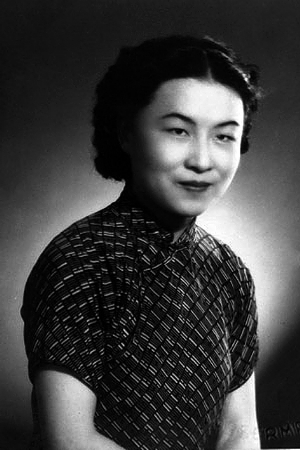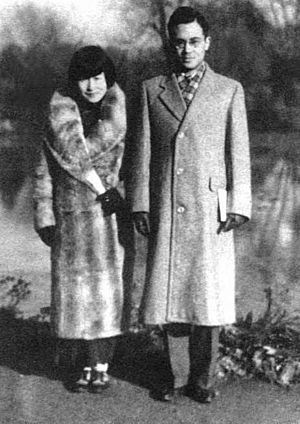Yang Jiang facts for kids
Quick facts for kids
Yang Jiang
|
|
|---|---|

Yang in 1941
|
|
| Born |
Yang Jikang (楊季康)
17 July 1911 |
| Died | 25 May 2016 (aged 104) Beijing
|
| Nationality | Chinese |
| Alma mater | Soochow University Tsinghua University University of Oxford University of Paris |
| Spouse(s) | |
| Children | Qian Yuan (1937–1997) |
| Parent(s) | Yang Yinhang (father) Tang Xuying (mother) |
| Yang Jiang | |||||||||
|---|---|---|---|---|---|---|---|---|---|
| Traditional Chinese | 楊絳 | ||||||||
| Simplified Chinese | 杨绛 | ||||||||
|
|||||||||
| Yang Jikang | |||||||||
| Traditional Chinese | 楊季康 | ||||||||
| Simplified Chinese | 杨季康 | ||||||||
|
|||||||||
Yang Jiang (born July 17, 1911 – died May 25, 2016) was a famous Chinese writer. She wrote plays, books, and translated many important works. She was known for her funny plays. Yang Jiang was also the first Chinese person to translate the entire Spanish novel Don Quixote into Chinese.
Contents
Life and Education
Yang Jiang was born in Beijing with the name Yang Jikang. She grew up in the Jiangnan area of China. After finishing her studies at Soochow University in 1932, Yang Jiang went to graduate school. She studied at Tsinghua University.
Meeting Qian Zhongshu
At Tsinghua University, she met Qian Zhongshu. They got married in 1935. From 1935 to 1938, they traveled to England to study more. They went to Oxford University. While in England, their daughter, Qian Yuan, was born in 1937.
Studying Abroad
Later, Yang Jiang and her husband studied in Paris, France, at Pantheon-Sorbonne University. They often spoke French and English together throughout their lives. They returned to China in 1938.
Writing and Translations
After returning to China, Yang Jiang lived in Shanghai. She wrote four plays for the stage. These included two comedies, Heart's Desire (1943) and Forging the Truth (1944). She also wrote a funny play called Sporting with the World (1947) and a sad play, Windswept Blossoms (1947).
Work as a Scholar
After 1949, she taught at Tsinghua University. She also studied Western literature at Peking University and the Academy of Science. She published her research in a book called Spring Mud in 1979. Both Yang Jiang and her husband, Qian Zhongshu, helped Chinese literature grow through their writing, research, and translations.
Translating Famous Books
Yang Jiang translated three major European adventure stories into Chinese. These were Lazarillo de Tormes (1951), Gil Blas (1956), and Don Quixote (1978). Her Chinese translation of Don Quixote is still thought to be the best version.
She learned Spanish by herself because she wanted to translate Don Quixote directly from the original language. She felt that other English and French translations were not good enough.
Challenges During Translation
During a difficult time in China called the Cultural Revolution, Yang Jiang's nearly finished translation of Don Quixote was taken from her home. She was also sent to a "cadre school" in Henan from 1969 to 1972. This was a place where people were sent to do physical labor and learn new ideas.
After this period, she returned to Beijing and finished her translation. The draft that was taken from her was found and returned. Her translation of Don Quixote was published in 1978. It is still highly respected in China.
Awards and Family
In 1986, King Juan Carlos of Spain gave her the Civil Order of Alfonso X, the Wise award for her translation of Don Quixote. Her sister, Yang Bi, was also a translator.
Later Works and Memoirs
Her experiences during the Cultural Revolution inspired her to write Six Chapters from My Life 'Downunder' (1981). This book made her famous as a writer after that period. She also wrote Soon to Have Tea (1983), which was connected to this memoir.
Novels and Family Memoirs
In 1988, she published her only novel, Baptism. This book is often linked to her husband's famous novel, Fortress Besieged.
Her 2003 memoir, We Three, shared memories of her husband and their daughter, Qian Yuan. Her daughter had passed away in 1997, and her husband died in 1998. Yang Jiang's daughter had even outlined the book We Three before she died. After her husband's death, Yang Jiang put together and edited his unpublished works.
Philosophical Writings
At the age of 96, she published Reaching the Brink of Life. This was a book about philosophy, which means it explored big ideas about life and death. The title of her book was a nod to her husband's collection of essays.
Later Life
Yang Jiang turned 100 years old in July 2011. A short novel called After the Baptism, which was a follow-up to her book Baptism, came out in 2014. Yang Jiang passed away on May 25, 2016, in Beijing, at the age of 104.
Her husband once said that Yang Jiang was "the most chaste wife and talented girl" in China. This showed how much he admired her as both a person and a scholar.
Works
Plays
- Heart's Desire (稱心如意) (1943)
- Forging the Truth (弄真成假) (1944)
- Sporting with the World (游戏人间) (1945)
- Windswept Blossoms (风絮) (1947)
Novels
- Baptism (洗澡) (1988)
- After the Bath (洗澡之後) (2014)
Essays
- Six Chapters from My Life 'Downunder' (幹校六記) (1981)
- About to Drink Tea (將飲茶) (1987)
- We Three (我們仨) (2003)
- Reaching the Brink of Life (走到人生邊上) (2007)
Translation Work
- Gil Blas
- Don Quixote
- Lazarillo de Tormes
- Phaedo
See also
 In Spanish: Yang Jiang para niños
In Spanish: Yang Jiang para niños
- List of centenarians (authors, poets and journalists)
 | James Van Der Zee |
 | Alma Thomas |
 | Ellis Wilson |
 | Margaret Taylor-Burroughs |


